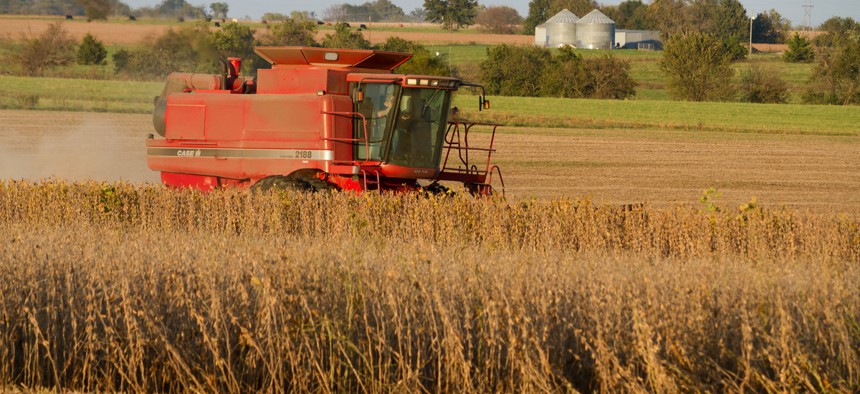Trump Administration to Provide $12 Billion in Relief to Farmers Hurt by Trade War

Eligible producers include soybean growers, one of the crops most affected by tariffs. shutterstock
The plan, which will include direct payments to some producers, was announced Tuesday.
The federal Department of Agriculture on Tuesday announced a $12 billion plan to help U.S. farmers who have been hurt by retaliatory trade tariffs from other countries.
“This is a short-term solution to give President Trump time to work on long-term trade policy and deals to benefit agriculture,” Secretary of Agriculture Sonny Perdue said on a call about the plan. “The programs we’re announcing today are a firm statement that other countries cannot bully our agricultural producers to force the United States to cave in.”
The plan, which officials said did not require congressional approval, will consist of three programs—one giving direct payments to farmers, one purchasing surplus food to distribute to food banks and other nutritional programs, and one to help develop new export markets with the help of the private sector.
Perdue said the programs are authorized under the Commodity Credit Corporation, or CCC, a division of the USDA created during the Great Depression to “stabilize, support and protect farm income and prices.”
Only growers of certain commodities will be eligible for each program. Direct payments, for example, are reserved for farmers hit hardest during the trade wars, including those that produce soybeans, sorghum, corn, wheat, cotton, dairy and pork.
Those payments will not start immediately, officials said, and the specific amounts will be based on the calculated damage to individual producers. USDA expects to publish more details in a few weeks.
Each of the programs is designed to “offset the trade damage we see facing our farmers” in the wake of the president’s trade war, which began when Trump imposed tariffs on steel, aluminum and $34 billion of Chinese products. Other countries, including Canada, Mexico, China and the European Union, imposed retaliatory taxes, many of them targeting agricultural exports.
Trump showed little sign of backing down Tuesday, proclaiming on Twitter that “tariffs are the greatest!”
“Either a country which has treated the United States unfairly on Trade negotiates a fair deal, or it gets hit with Tariffs,” the president continued. “It’s as simple as that—and everybody’s talking! Remember, we are the ‘piggy bank’ that’s being robbed. All will be Great!”
Some congressional Republicans, already wary of Trump’s approach to trade, panned the deal ahead of its release Tuesday.
“This trade war is cutting the legs out from under farmers and the White House’s ‘plan’ is to spend $12 billion on gold crutches. America’s farmers don’t want to be paid to lose—they want to win by feeding the world,” Sen. Ben Sasse of Nebraska said in a statement. “This administration’s tariffs and bailouts aren’t going to make America great again, they’re just going to make it 1929 again.”
A simpler solution would be to reverse the original tariffs, said Sen. Rand Paul of Kentucky.
“If tariffs punish farmers, the answer is not welfare for farmers,” Paul wrote on Twitter. “The answer is remove the tariffs.”
In response to those criticisms, federal agricultural officials emphasized that the short-term program is intended only to give the administration space to work out long-term, permanent trade deals.
“We hope it will allow time to conclude trade negotiations that will indeed open those markets and restart trade,” said Greg Ibach, USDA’s undersecretary for marketing and regulatory programs. “Like the secretary said, we’re hoping that other countries will see that we’re serious now about trade negotiations…[we] hope they will come to the table and negotiate in good faith so we can move forward.”
Some agricultural producers welcomed the move.
“We respect the administration for following through with their promise to stand by U.S. farmers, and we look forward to working with Secretary Perdue in providing much-needed funds to sorghum farmers and other producers impacted by tariffs,” Dan Atkisson, a sorghum farmer from Kansas and chairman of the National Sorghum Producers Legislative Committee, said in a statement. “NSP fully supports fairer trade and will continue to work with officials to achieve long-term trade solutions.”
The American Soybean Association likewise welcomed the relief, but said the program would work only as a stopgap until a long-term trade solution can be developed. U.S. soy prices have dropped more than $2 per bushel since late May, when discussion of tariffs between the U.S. and China ramped up.
“U.S. soybean producers want to see President Trump succeed in meeting his trade campaign goals of achieving better trade deals and greater market access. And, we appreciate that he has recognized our loss in exports and lower prices and provided some immediate relief,” John Heisdorffer, a soybean grower from Iowa and the association’s president, said in a statement. “However, producers cannot weather sustained trade disruptions.”
In a statement, the president of the Illinois Farm Bureau cautioned that short-term financial help would not solve the problem for the state's agricultural producers. Illinois led the country in soybean production last year.
“The economic and marketing damage caused by these tariffs will continue as long as they’re in effect, and likely, far longer," said Illinois Farm Bureau President Richard Guebert, Jr. "That’s why we urge the president and the administration to continue to negotiate trade deals with our global partners, including Mexico, Canada, Japan and the European Union, and get back to the table with China, to work on resolving unfair trade practices that are the underlying issue.”
Kate Elizabeth Queram is a Staff Correspondent for Government Executive’s Route Fifty and is based in Washington, D.C.
NEXT STORY: US-Mexico Border Barriers Threaten 1,500 Plant and Animal Species





